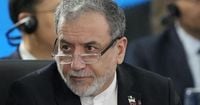On the heels of a turbulent summer, Iran finds itself at the crossroads of diplomacy, national unity, and military posturing. Recent developments have thrust the Islamic Republic back into the international spotlight, as its leaders navigate fraught nuclear negotiations, showcase domestic cohesion, and demonstrate military might in the aftermath of a brief but intense conflict with Israel.
On August 22, 2025, Iranian Foreign Minister Abbas Araqchi and his counterparts from France, Britain, and Germany reached an agreement to resume critical talks on Iran's nuclear program and the associated international sanctions. As reported by Iranian state media and confirmed by German Foreign Minister Johann Wadephul, deputy foreign ministers from all parties are scheduled to reconvene on Tuesday, August 26, 2025. The stakes could hardly be higher: the three European powers have warned that they are prepared to re-activate United Nations sanctions against Iran through a so-called 'snapback' mechanism if Tehran does not commit to a verifiable and durable agreement to curb its uranium enrichment activities.
"Time is very short and Iran needs to engage substantively," Wadephul cautioned, underscoring the urgency that now surrounds the diplomatic process. The European trio, along with the United States, continue to express concerns that Iran's nuclear program could be a cover for developing weapons capability, despite Iran's insistence that its ambitions are strictly civilian. The International Atomic Energy Agency (IAEA), the United Nations' nuclear watchdog, has maintained that Iran is not close to developing a nuclear bomb. In March, U.S. national intelligence director Tulsi Gabbard testified that there was no evidence of Iran moving toward a nuclear weapon.
These negotiations are unfolding in the shadow of a dramatic escalation earlier this summer. In June 2025, a 12-day war erupted after the United States and Israel bombed Iranian nuclear sites, prompting Iran to suspend ongoing nuclear talks with Washington. The conflict, brief but consequential, left a trail of uncertainty and heightened tensions across the region. Since the war, IAEA inspectors have been unable to access Iran’s nuclear installations, a development IAEA chief Rafael Grossi described as deeply concerning. He reiterated that inspections remain essential for maintaining transparency and trust. The last meeting between Iran and the European powers took place in Geneva on June 20, 2025, while the conflict was still underway, yielding little progress.
As the diplomatic machinery grinds forward, Iran is also making moves on the military front. On August 21, 2025, just one day before the resumption of nuclear talks was announced, Iranian state television reported that the country had conducted its first military exercise since the end of the June war with Israel. According to the Associated Press, the exercise saw Iranian navy vessels launching missiles at targets at sea in the Gulf of Oman and the Indian Ocean. The timing of these drills is hardly coincidental, serving as both a demonstration of Iran's defensive capabilities and a message to domestic and foreign audiences that the nation remains vigilant and prepared.
Yet, perhaps the most striking development in recent weeks has been the renewed emphasis on national unity as a strategic asset. At the "Oppressed Palestine, the Axis of Unity for the Nation of Muhammad" conference in Gorgan, Peyman Jebelli, head of Iran's national media, delivered a speech that resonated deeply with the current national mood. Jebelli stressed that the country's media transformation document is a covenant with both the Supreme Leader and the people, guiding all national media programs. "The solidarity of Shia and Sunni and the unity of ethnic groups in Iran is a small manifestation of the same solidarity of the Islamic nation. This cohesion is a deterrent weapon against enemies, and the national media must strive more than ever to explain and strengthen it," he declared, according to Taghrib News Agency.
Jebelli went on to highlight the resilience displayed by Iranians during the recent 12-day war. "The enemy, with a wrong calculation, had counted on the economic problems of Iranian society and thought the nation would crumble from within with the first blow, but the result was completely the opposite. National cohesion, the unity of ethnicities and sects, and Islamic solidarity surprised the enemy and saved the country," he said. This narrative of unity in the face of adversity is being promoted as a key element of Iran's defense, both materially and psychologically.
He also pointed to the enduring support of Iranian youth for the system, despite ongoing economic and generational challenges. Jebelli referred to this youthful support as a "capital" that the Supreme Leader values deeply. "The Supreme Leader has repeatedly emphasized that if the Islamic nation does not use its internal power, enemies will resort to aggression and crime in different parts of the Islamic world. The recent experience showed how deep and correct the Leader's precise and forward-looking view was in his 'Second Step' statement and his messages to the world's youth," Jebelli said.
Iran's sense of belonging to a broader Islamic nation, and the solidarity that comes with it, was another theme Jebelli underscored. He cited the inspiration that the Islamic Revolution has provided to movements from North Africa to West Asia, and the support offered by Sunni resistance fighters in Palestine and Lebanon. "The Islamic nation, with all its sects and ethnicities, is a real and reliable support for us," he stated, pushing back against any "deviant views" that question the relevance of the broader Islamic community to Iran's security and future.
As Iran prepares to send a delegation to Vienna to meet with IAEA officials on August 22, 2025, the nation faces a daunting set of challenges. The path forward hinges on the outcome of delicate nuclear negotiations, the ability to maintain domestic cohesion, and the readiness to deter external threats—whether through military exercises or diplomatic maneuvering.
For now, Iran's leaders are betting that unity at home and a careful balancing act abroad will keep the country secure and its interests safeguarded. The coming weeks will reveal whether this strategy can withstand the mounting pressures from within and without.

